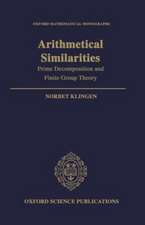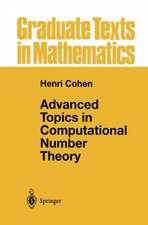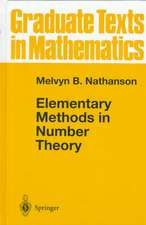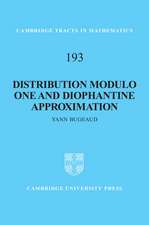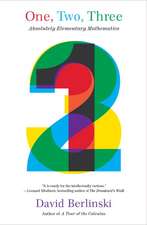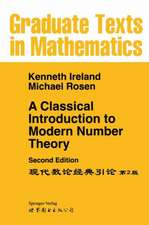Sequences
Autor H. Halberstam, K. F. Rothen Limba Engleză Paperback – 14 oct 2011
Preț: 389.31 lei
Nou
Puncte Express: 584
Preț estimativ în valută:
74.50€ • 77.94$ • 61.88£
74.50€ • 77.94$ • 61.88£
Carte tipărită la comandă
Livrare economică 02-16 aprilie
Preluare comenzi: 021 569.72.76
Specificații
ISBN-13: 9781461382294
ISBN-10: 1461382297
Pagini: 316
Ilustrații: 293 p.
Dimensiuni: 155 x 235 x 17 mm
Greutate: 0.45 kg
Ediția:Softcover reprint of the original 1st ed. 1983
Editura: Springer
Colecția Springer
Locul publicării:New York, NY, United States
ISBN-10: 1461382297
Pagini: 316
Ilustrații: 293 p.
Dimensiuni: 155 x 235 x 17 mm
Greutate: 0.45 kg
Ediția:Softcover reprint of the original 1st ed. 1983
Editura: Springer
Colecția Springer
Locul publicării:New York, NY, United States
Public țintă
ResearchCuprins
I. Addition of Sequences: Study of Density Relationships.- § 1. Introduction and notation.- § 2. Schnirelmann density and Schnirelmann’s theorems. Besicovitch’s theorem.- § 3. Essential components and complementary sequences.- § 4. The theorems of Mann, Dyson, and van der Corput.- § 5. Bases and non-basic essential components.- § 6. Asymptotic analogues and p-adic analogues.- § 7. Kneser’s theorem.- § 8. Kneser’s theorem (continued): the ?-transformations.- § 9. Kneser’s theorem (continued): proof of Theorem 19—sequence functions associated with the derivations of a system.- § 10. Kneser’s theorem (continued): proofs of Theorems 16? and 17?.- § 11. Hanani’s conjecture.- II. Addition of Sequences: Study of Representation Functions by Number Theoretic Methods.- § 1. Introduction.- § 2. Auxiliary results from the theory of finite fields.- § 3. Sidon’s problems.- § 4. The Erdös—Fuchs theorem.- III. Addition of Sequences: Study of Representation Functions by Probability Methods.- § 1. Introduction.- § 2. Principal results.- § 3. Finite probability spaces: informal discussion.- § 4. Measure theory: basic definitions.- § 5. Measure theory: measures on product spaces.- § 6. Measure theory: simple functions.- § 7. Probability theory: basic definitions and terminology.- § 8. Auxiliary lemmas.- § 9. Probability theory: some fundamental theorems.- § 10. Probability measures on the space of (positive) integer sequences.- § 11. Preparation for the proofs of Theorems 1–4.- § 12. Proof of Theorem 1.- § 13. Proof of Theorem 2.- § 14. Proof of Theorem 3.- § 15. Quasi-independence of the variables rn.- §16. Proof of Theorem 4—sequences of pseudo-squares.- IV. Sieve Methods.- § 1. Introduction.- § 2. Notation andpreliminaries.- § 3. The number of natural numbers not exceeding x not divisible by any prime less than y.- § 4. The generalized sieve problem.- § 5. The Viggo Brun method.- § 6. Selberg’s upper-bound method: informal discussion.- §7. Selberg’s upper-bound method.- § 8. Selberg’s lower-bound method.- § 9. Selberg’s lower-bound method: further discussion.- § 10. The ‘large’ sieves of Linnik and Rényi.- V. Primitive Sequences and Sets of Multiples.- § 1. Introduction.- § 2. Density.- § 3. An inequality concerning densities of unions of congruence classes.- § 4. Primitive sequences.- § 5. The set of multiples of a sequence: applications including the proofs of Theorems 4 and 5.- § 6. A necessary and sufficient condition for the set of multiples of a given sequence to possess asymptotic density.- § 7. The set of multiples of a special sequence.- § 8. Proof of Theorem 15.- § 2. The distribution of prime numbers.- § 3. Mean values of certain arithmetic functions.- § 4. Miscellanea from elementary number theory.- References.- Postscript.- Author Index.

